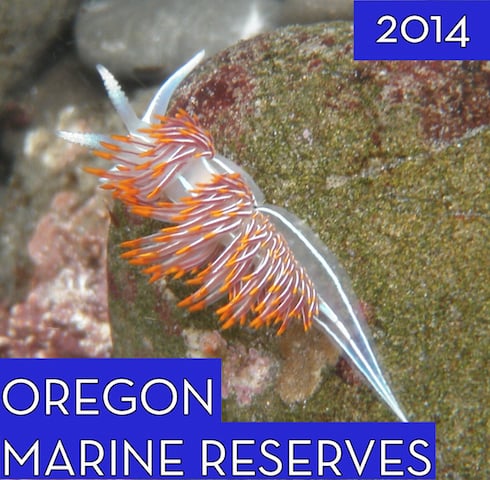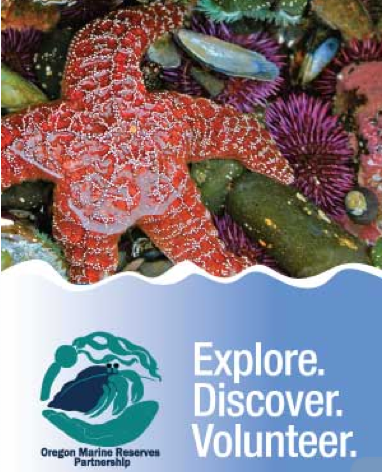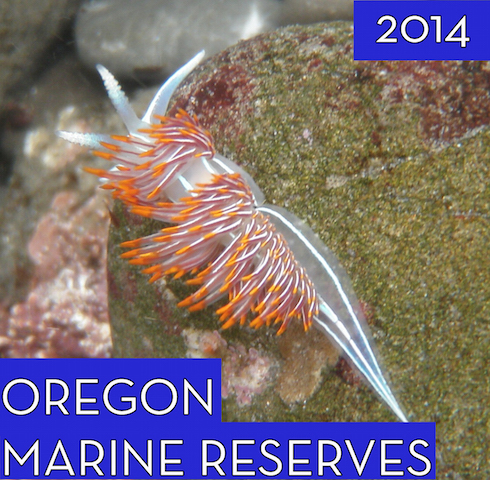
We’re nearing the end of 2014 and many are interested in the status of the marine reserve program. Many exciting things have happened this year as two more marine reserves came online, Cape Perpetua and Cascade Head, joining Otter Rock and Redfish Rocks which went into effect in 2012. In this post we’ll update you on the latest and greatest for Oregon’s Marine Reserve program, including a site by site status guide for locating handy information and tracking the progress of each reserve.
From early advocacy for designation to integration with local programs, citizen science, outreach and stewardship efforts, Surfrider chapters and volunteers have been playing an integral role with marine reserves in Oregon for nearly 10 years. This year, Surfrider collaborated with Oregon Department of Fish and Wildlife and other partners to help conduct community outreach meetings, develop brochures, outreach materials, and create better communication tools such as maps and interpretive materials. We’ve hosted a number of events and workshops to help bridge partner efforts and engage our membership in supporting these special places.
Building on our strong partnerships, we formally launched The Oregon Marine Reserves Partnership (OMRP) with 5 other founding members (The Nature Conservancy, The Audubon Society, Oceana, Coast Range Association and Oregon Shores Conservation Coalition) to better collaborate on local and statewide marine reserve efforts. Surfrider and other partners are now hosting many of our marine reserve volunteer and citizen science efforts on the OMRP website, check out all the ways you can volunteer!
Research and Management - State Workplan and Implementation
As the lead agency, Oregon Department of Fish and Wildlife’s (ODFW) Marine Reserves Program Workplan lays out all the details for research reports and general management of marine reserves. The status report for each marine reserve site at the bottom of this post will give you an idea of where ODFW is within this workplan as we wrap up 2014. For the agency workplan at a glance check out: ODFW Marine Reserves Program Overview
In a jiffy though, here’s what you probably ought to know:
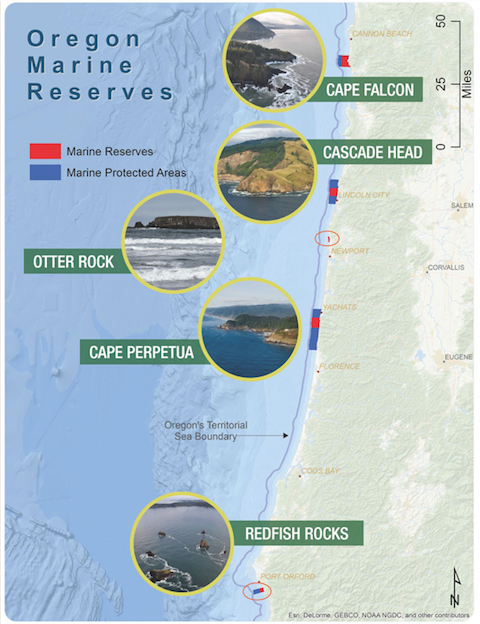 Cape Falcon Marine Reserve will go into effect in 2016. Oregon's other 4 marine reserves and associated protected areas are now all in effect.
Cape Falcon Marine Reserve will go into effect in 2016. Oregon's other 4 marine reserves and associated protected areas are now all in effect.
For all marine reserves in Oregon, 2 years of research and monitoring was/is conducted prior to any harvest restrictions going into effect. This is one of the reasons why we have a “phased implementation”, with Redfish Rocks and Otter Rock Marine Reserves going into effect in 2012, Cape Perpetua and Cascade Head Marine Reserves going into effect in 2014 and Cape Falcon Marine Reserve following in 2016. The phased approach gives the agency and researchers enough time to conduct some of this initial research and monitoring. After that, research and monitoring continues for each marine reserve on an ongoing basis and progress reports for each reserve are available every 2 years.
Beyond research, marine reserve outreach, compliance and community engagement are to some degree also guided by individual management plans for each marine reserve. Check out the marine reserves site status update at the bottom of this post for updates on research reports and management plans for each of the individual sites.
Science you can see!
With so many groups and entities conducting research and monitoring in marine reserves, we thought some of the most interesting science to many is just seeing what’s actually down there beneath the surface in our marine reserves! Below we’ve pulled a couple of interesting video highlights taken from ODFW’s remotely operated underwater vehicle (ROV) for you to check out. Video from ROV work is just one of many forms of research that helps inform on habitat and species assemblages. ODFW conducts both ecological and human/social monitoring and research, to better understand the impacts of marine reserves on both the ocean and human environment.
The above ROV video from ODFW’s monitoring of Redfish Rocks Marine Reserve/Marine Protected Area highlights 15 different fish species and identifies each species as they appear on the screen.
Pay attention at about 12 seconds in, an army of thousands of juvenile Dungeness Crab appear on video, from video sled monitoring in the ocean off of Tokatee State Park within the Cape Perpetua Southeast Marine Protected Area. Videos like these help researchers better understand how Dungeness Crabs, an important commercial fishery for Oregon, utilize Cape Perpetua’s mixed sandy bottom habitat.
Oregon's rocky reefs are host to an amazing array of colorful invertebrates! Here's a highlight of 19 commonly found from Redfish Rocks Marine Reserve.
Beyond the Agency - Marine Reserve Communities
Communities have been responding to and engaging in marine reserves in a number of ways from citizen science and outreach to more formal management, research and scientific partnerships. Academic researchers, other agencies and research institutions collaborate with ODFW on many of the scientific monitoring efforts. At the local level, groups like the Redfish Rocks Community Team and Depoe Bay Nearshore Action Team formed years ago to guide interest and engagement in Redfish Rocks and Otter Rock marine reserves.
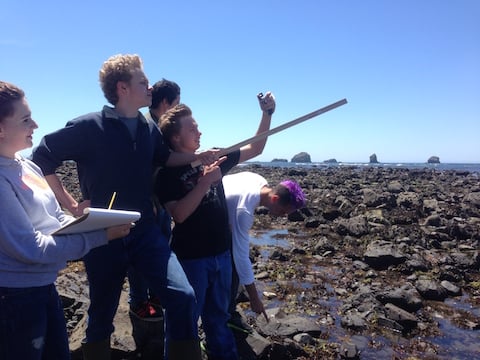 Students find GPS coordinates at Redfish Rocks Marine Reserve for intertidal surveys as part of a citizen science effort with Redfish Rocks Community Team and Surfrider
Students find GPS coordinates at Redfish Rocks Marine Reserve for intertidal surveys as part of a citizen science effort with Redfish Rocks Community Team and Surfrider
With dozens of citizen science, stewardship and outreach initiatives popping up across all marine reserve sites over the past couple of years, similar community groups are in the early stages of development at Cape Perpetua, Cascade Head and Cape Falcon Marine Reserves. Further, the newly formed Oregon Marine Reserve Partnership is serving as a new platform in 2014 and beyond for NGOs, agencies, researchers and local communities to better collaborate on local and statewide efforts supporting successful marine reserves.
Site by Site Marine Reserve Status Updates
Below, we outline the status of each marine reserve with handy links to reference documents for each site.
Redfish Rocks:
Status: Harvest restrictions in effect (since January 2012)
Research: 2010-2011 Monitoring Reports Available
Download Ecological, Download Human/Social
Maps/Brochures/FAQs: Go here to view and download materials
Management Plan: In place, review in 2017
Download Current Management Plan
Community Engagement: Redfish Rocks Community Team has been serving as the lead platform for community engagement in this reserve site since 2010. Learn more!
Otter Rock:
Status: Harvest restrictions in effect (since January 2012)
Research: 2010-2011 Monitoring Report Available -
Download Ecological, Download Human/Social
Maps/Brochures/FAQs: Go here to view and download materials
Management Plan: In place, review in 2017
Download Current Management Plan
Community Engagement: The Depoe Bay Nearshore Action Team has been serving as the lead platform for community engagement in this reserve site since 2012. Learn more.
Cape Perpetua
Status: Harvest restrictions in effect (since January 2014)
Research: 2012-2013 monitoring complete - reports available 2015
Maps/Brochures/FAQs: Go here to view and download materials
Management Plan: In process, projected completion spring 2015
Community Engagement: ODFW has held 3 official community workshops to explore local priorities, download notes. With various stewardship, citizen science, and local programs already underway by local groups, there are many platforms in which the community is engaging, however ODFW is still exploring long term options for community group structure.
Cascade Head
Status: Harvest restrictions in effect (since January 2014)
Research: 2012-2013 monitoring complete - reports available 2015
Maps/Brochures/FAQs: Go here to view and download materials
Management Plan: In process, projected completion spring 2015
Community Engagement: ODFW has held 3 official community workshops to explore local priorities, download notes. With various stewardship, citizen science, and local programs already underway by local groups, there are many platforms in which the community is engaging, including the early stages of community team development; however, ODFW is still exploring long term options for community group structure.
Cape Falcon
Status: Harvest restrictions not in effect until January 2016
Research: 2014-2015 monitoring underway - reports available 2017
Maps/Brochures/FAQs: Go here to view and download materials (brochure not yet developed)
Management Plan: Not yet started, process to begin 2015
Community Engagement: ODFW has yet to begin any formal community engagement in preparation for this site. Community and grassroots efforts have however started to engage in various ways, such as the early organizing of a local Friends of Cape Falcon group. Check out how our Portland Chapter's engaging in this effort.
Further Information
For further information on how Surfrider and other partners are engaging in marine reserve efforts and to learn more about opportunities to volunteer, visit the Oregon Marine Reserves Partnership website at: www.oregonmarinereserves.org. For official ODFW and agency information, rules, boundaries, scientific monitoring reports and more visit: www.oregonocean.info/marinereserves

